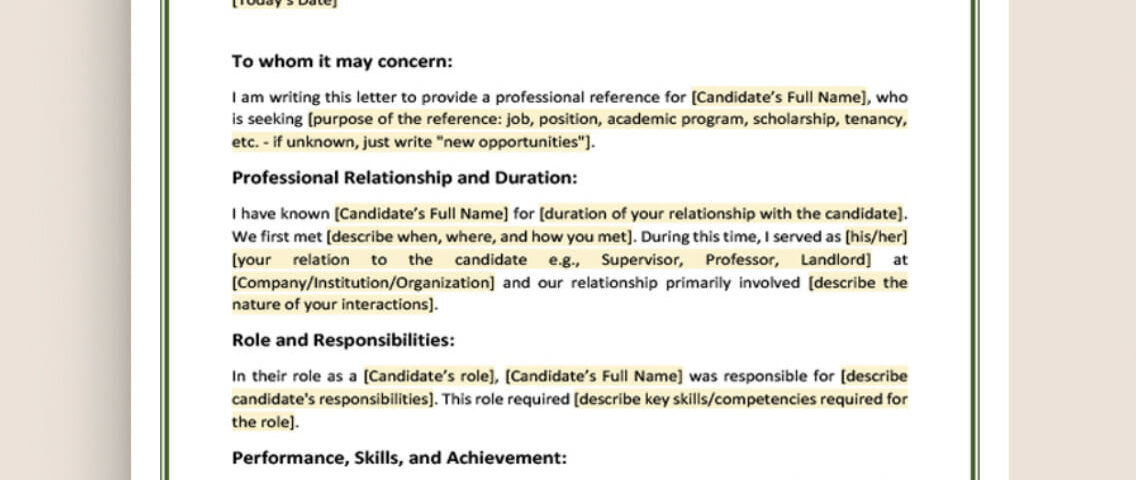Applications are very formulaic and don’t give much personal insight into the applicant. This can make it difficult for the recipients to determine whether a potential student, volunteer, or employee would be a good fit. Naturally, the solution is to get more data from a source that can provide a personal perspective. That is why a professional reference form is crucial to include in applications of all types to gain a more rounded perspective on the applicant. In this article, we’ll teach you everything you need to know to use our high-quality template to quickly and easily create this crucial supplemental document for your applicants.
Reference Forms
What Is a Reference Form?
A reference form is an essential supplemental document used to collect additional information and feedback about an applicant from individuals who can provide insights into their skills, qualifications, character, and work experience. This form can help check references and verify application details so employers can assess an applicant’s suitability for a specific role or position. Moreover, it often includes unexpected and helpful insight into the subject that would not otherwise have been apparent from a standard application or cover letter.
Fun Fact: Reference forms and the idea of requiring personal references have existed for thousands of years.
Why Is Reference Form Important?
A reference form is important because it gives recipients valuable information and feedback about applicants’ qualifications and character. Here are the main reasons why you should have every candidate submit this form:
- Verification of Information: Reference forms help employers verify the accuracy of the information the applicant provides in their resume or job application.
- Assessing Fit: By gathering insights from people who have worked closely with the applicant, reference forms help employers, educational institutions, and organizations evaluate the candidate’s potential fit, skills, and abilities.
- Performance Evaluation: Reference forms are a platform where previous supervisors, colleagues, or mentors assess the applicant’s past performance, work ethic, and professional behavior.
- Character Assessment: Recipients can better understand the applicant’s character, interpersonal skills, and ability to work in a team by reading the information given on reference forms.
- Skill Assessment: Reference forms often include questions specifically designed to assess the applicant’s relevant skills, allowing recipients to evaluate their competency in key areas.
- Risk Mitigation: These invaluable documents also function as a risk mitigation strategy for helping to reduce the chances of selecting unsuitable candidates or individuals with a history of performance or behavioral issues.
Important Note: Before selecting references, it is important to contact the individuals you wish to have to write about you and ask them first. It helps to keep the writers appraised of the requirements, timeframe, and importance of the reference forms and let them know they may need to provide personal contact information since they may be called upon for additional details or verification purposes. Also, take the time to thank your references personally once they’ve submitted the forms on your behalf.
Essential Elements of Reference Form
The essential elements of a reference form are designed to gain insights and input from an outside source who is familiar with a candidate. Here is what you should expect to see on a professional template:
- Form Title: At the top, you must clearly indicate that the document is a reference form, distinguishing it from other application materials.
- Applicant Information: In the first section, collect essential details about the applicant, like their name, contact information, and the position they are applying for. This helps to organize, store and reference the document and prevents confusion about which application they belong with.
- Reference Provider Information: The next section aims to gather basic information about the individuals providing the references, including their names, position, organization, and contact details. Usually, it also asks about their relation to the applicant.
- Reference Questions: Here, you need to include a set of structured questions to gather information about the applicant’s skills, qualifications, work experience, character, and job fit. These questions may cover areas such as the applicant’s strengths, weaknesses, ability to work in a team, problem-solving skills, and relevant job-specific competencies. Often there is a basic skill assessment with a ranking system. Most importantly, this section should be customized to collect relevant information for the specific position or opportunity the applicant seeks.
- Gratitude Statement: Always conclude a reference form with a statement expressing gratitude to the reference provider for their time and input. This final section can also include contact information for the recipient or instructions for how and when to submit the document.
Pro Tip: Take the time to proofread and edit your reference form before submitting it. This document can help advance someone’s career, education, or volunteer service opportunities, and putting your best foot forward makes you look professional and increases the chances of the applicant.
FAQs
The purpose of a reference form in a job application is to collect information and feedback from individuals who have worked closely with the applicant in the past. The information gained from reference forms allows recipients to assess an applicant’s personal qualities and qualifications, providing additional insights beyond what is available from the applicant’s resume or interview. Reference forms help employers, educational institutions, and volunteer coordinators make better-informed, more well-rounded decisions and mitigate risks by obtaining feedback from trusted sources who can provide valuable perspectives on the applicant’s abilities and suitability for the role.
The individuals chosen as references for the applicant should complete the reference form. To do this, they should carefully review the questions provided in the form and provide accurate and honest responses based on their knowledge and experience working with the applicant. Reference providers need to take the time to provide thoughtful and specific examples to support their assessments of the applicant’s qualifications and skills. Additionally, the reference providers need to complete the form in a timely manner to ensure that the information is available to the employer during the evaluation process.
A reference form typically asks for information relevant to the specific opportunity that can help verify the details of an application and provide additional information. Common types of questions include inquiries about the applicant’s strengths and weaknesses, ability to work in a team, problem-solving skills, communication skills, leadership potential, and specific competencies. The form may also ask for examples or specific incidents illustrating the applicant’s abilities or valuable personal characteristics. Finally, the reference form might request general feedback or comments about the applicant’s overall suitability for the position they are applying for.
The number of references to include in the reference form vary based on the recipients’ requirements or preferences. In general, it’s best to include a minimum of three diverse references. Doing this allows recipients to gather a well-rounded perspective on your qualifications and work history. It is important to choose references who can answer honestly, highlight your best qualities, and offer a reliable reference. Selecting individuals from different professional backgrounds, such as supervisors, colleagues, coaches, or mentors, can provide a more comprehensive assessment and show you are well-rounded.
Key Points
Reference forms are essential to any serious application process, providing employers, organizations, and educational institutions with helpful insights into an applicant’s qualifications, skills, and character that cannot be obtained any other way. Since these documents are a means of verifying information, assessing performance, and mitigating risks, they significantly contribute to the overall effectiveness and reliability of the recruitment process. By using our reference form template, employers can gather objective and reliable information from trusted sources to make informed hiring decisions.

